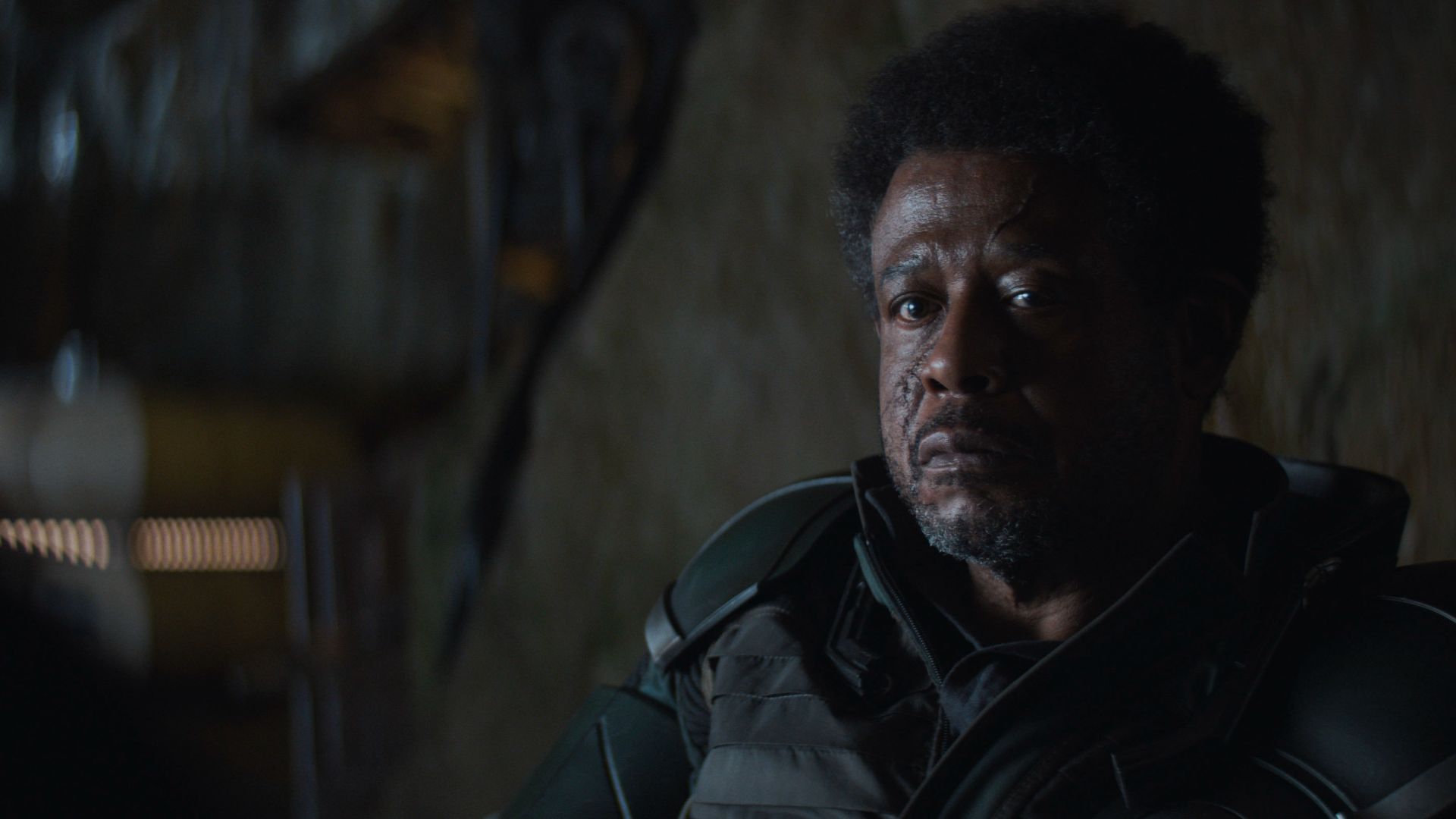GamesRadar+ Verdict
The calm before the storm. Andor looks back on the sacrifices these characters have had to make for the greater good, delivering a grief-stricken episode that sets up a finale for the ages
Why you can trust GamesRadar+
Warning! This review contains spoilers for Andor episode 11. If you've not yet caught up, turn back now!
How much are you willing to sacrifice for the greater good? Thirty men and their leader? A family fortune? Your child's right to marry who they want? Your own mother? Or all of the above? A long time ago, in a galaxy far, far away, that was the price to truly live. Over the course of eleven episodes, Andor has shown us the human cost of being a hero – and it's not pretty.
The episode starts with the loss of Fiona Shaw's Maarva. Though only in a few scenes, Shaw proved a brilliant choice as Cassian's commanding, fierce adoptive mother, and her character's death being framed through the eyes of a droid is an inspired choice. Director Ben Caron turns B2EMO into a grieving pet without its master; a lost hound hoping that its mother will step through the doors any minute now. When B2EMO asks its new human to stay the night, just one more night, it's tragically sad, and begs the question: how will Cassian react to the news?
Indeed, the entire episode is gearing up to the final reveal, when Cassian calls home to tell someone to tell Maarva that he's doing OK and that she would be proud of him. It's a gut-wrenching moment as his conspirator on Ferrix tells him that his mother is dead. Worse still, Cassian knows nothing of the peril that awaits him back home. Denise Gough's terrifying Dedra, only briefly appearing here, wants the Empire on full alert when Maarva's funeral takes place. The posh-girl-turned-rebel Vel makes sure Luthen's assistant is aware of what's going down, all while Vel's partner Cinta waits patiently on Ferrix for Cassian's return. Even Kyle Soller's Syril is made aware, by his former colleague, that Cassian's coming home. All eyes are on Maarva's funeral – a showdown between all these characters has become inevitable.
Before Cassian finds out about Maarva, though, he has to make his way off this damned planet where he was imprisoned. Showrunner Tony Gilroy has been somewhat hesitant to fill Andor with aliens – just look at Ferrix, Coruscant, and the prisoners who were trapped alongside Cassian – yet we get two particularly good creatures here. And even if Cassian (and myself) can barely understand a word they're saying, it's a fun reminder that, yes, this really is a Star Wars show. Because, at times, it can be easy to forget that fact, so grounded in grief and struggle and true rebellion has Andor become.

An example: we get a brief scene with Bix, played by Adria Arjona, who has become somewhat lost in the show's ensemble. Bix has been tortured, brutally, and is unable to say a word. She cries as one of the Empire's generals asks her more questions. Never has the Empire been depicted more horrendously than in Andor. We may have seen them destroy entire planets with Death Stars and Starkillers, but the human factor was never truly realized like it is here. In Andor, we see Bix trying to do what's good for her friends and family and the rebellion, and being beaten and damaged, perhaps beyond repair, because of her unwillingness to comply. It's a haunting moment that says everything about both Bix and the Empire's true nature.
Also upsetting is Mon Mothma dealing with her lost fortune. She's given every penny she can to growing the rebellion, but it's not enough. The books haven't been cooked quite well enough. She's not as valuable an asset to the cause without being a member of the Senate, where she's able to somewhat influence events and, at the very least, spy on the Empire's antics and feed their plans back to Luthen. The cost of correcting her financial misgivings, though, is her daughter's potential marriage to the son of a shady, power-hungry money man. Genevieve O'Reilly conjures all the emotions as Mon, holding back tears talking to Val. Another instance of a devastatingly brilliant performance in Andor.
Perhaps the episode's highlight, however, is the tense exchange between Stellan Skarsgård's Luthen and Forest Whitaker's Saw Gerrera. Luthen understands that sacrificing thirty men is a necessary evil to make sure the Empire is not made aware of his man on the inside. Saw initially disagrees; they should save their men. A blaster is drawn and Luthen, for a brief moment, looks set to leave this mortal coil. Then, the tides change, and Saw agrees with Luthen. It's a testament to the writing and the acting that a scene in a dark cave has so much ferocity. And the fact that straight after we're gifted a dog fight in space, in which Luthen takes on a roaming Empire ship and lives to tell the tale, is just the cherry on top of a thrilling storyline.
Where the episode falters is simply in that it sets up an exciting confrontation to come, rather than being the climax itself. It also arguably spends a little too much time reflecting on what these characters have sacrificed, feeling, at times, like a recap of what's come before. The last episode ended with a similar sentiment as Luthen gave a jaw-dropping speech about what he's had to give up for the fight. That single scene lessens the impact here. Still, it's all so brilliantly done, the themes tied together so well, and the setup so tantalizing, that any repetition can be forgiven. Should Andor land the upcoming finale, we're not just looking at the best Star Wars series so far, but arguably one of the best shows of the year – if not the best.
New episodes of Andor stream on Disney Plus every Wednesday. For more, check out our guide to all the upcoming Star Wars movies heading your way soon.
More info
| Genre | Sci-fi |

Jack Shepherd is the former Senior Entertainment Editor of GamesRadar. Jack used to work at The Independent as a general culture writer before specializing in TV and film for the likes of GR+, Total Film, SFX, and others. You can now find Jack working as a freelance journalist and editor.


